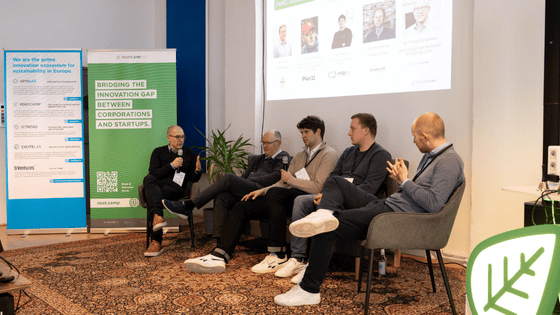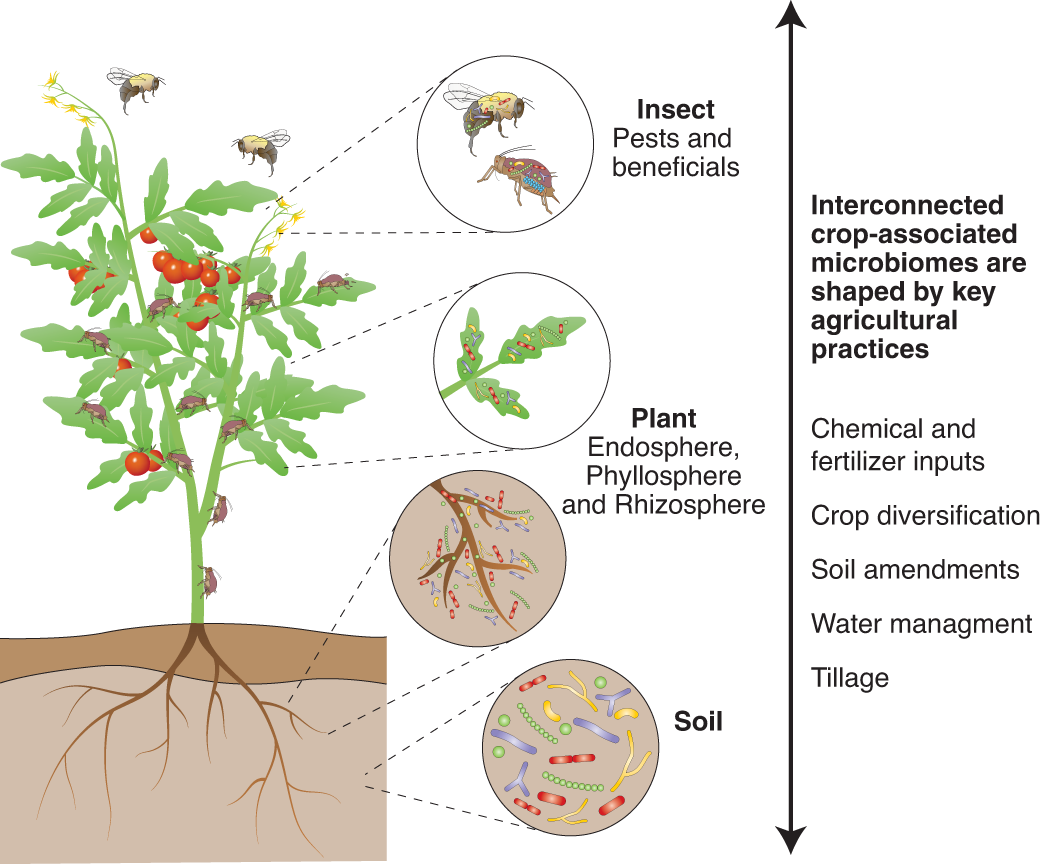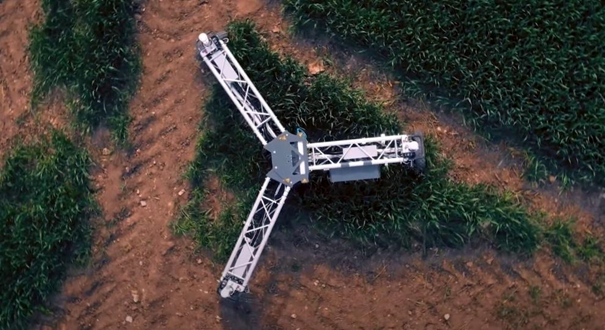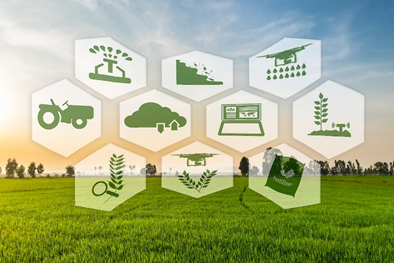A critical factor in successful decarbonisation is the use of data. The digital transformation of agriculture can not only increase efficiency, but also make a sustainable contribution to reducing the industry's ecological footprint. However, clear standards and a harmonised database are needed to exploit the full potential of data. The role of standardized data was discussed at this year's RootCamp Demo Day in a panel with Dr. Philipp Rittershaus, Head of Corporate Innovation & Startup Coaching, Ole Storm, Digital Manager at Rapool; Dr. Christian Henning, CEO of permarobotics and Head of the German Delegation at ISO TC 347, Jon Goriup, CEO and Co-Founder of RootCamp startup vcg.ai and Loet Rummenie, Program Director at STARTLIFE.
Recent posts by Ilka Gomez
3 min read
Digitalizing Bioeconomy: How Data drives Decarbonization
By Ilka Gomez on Mar 3, 2025 4:12:58 PM
Topics: demo day
6 min read
Towards climate-smart livestock
By Ilka Gomez on Oct 4, 2022 10:15:27 AM
The global livestock sector contributes to a significant share of anthropogenic greenhouse gas emissions, and efforts to reduce the sector’s emissions and its environmental footprint have accelerated. Technologies and practices that help reduce emissions exist, and their adoption and use by the majority of the world’s producers can significantly mitigate the impact of climate change. In addition, the European Commission through the Green Deal has set a series of targets including the no net emissions of greenhouse gases by 2050, helping companies to become world leaders in clean products and technologies, and supporting economic growth decoupled from resource use. But what does it mean in practice? How is the national or European regulatory framework shaping climate-smart livestock?
Topics: Livestock climate-smart
7 min read
Best practices on livestock farming
By Ilka Gomez on Sep 23, 2022 10:57:06 AM
The livestock sector faces enormous environmental challenges like high emissions, water and land usage, as well as changes in consumer behavior and the increasing importance of animal welfare. To be in line with the climate objectives, emissions need to be reduced significantly. As part of the BLIVE project, Innovation Hub RootCamp collected seven best practices that are improving the management of livestock farm.
Topics: startups Livestock
4 min read
The first RootCamp Demo Days in person - Day 1 livestock farming
By Ilka Gomez on Sep 16, 2022 9:00:00 AM
After three months of intensive work, the RootCamp Acceleration Program Batch #3 reached its end. To complete this amazing journey, we organized not only one but 2 Demo Days onsite in Hanover with focus on livestock farming and carbon farming.
Transforming the livestock sector
Together with the German AgriFood Society, we are implementing the BLIVE project to boost innovation and start building a pan-European network in the livestock sector. Increased global demand from the society for better animal welfare, improved sustainability across the livestock value chain, as well as the effect of the climate change are only a few of the challenges the livestock sector is facing. Innovation is key and will remain essential to address these challenges, and to ensure the contribution of the sector to the global food and nutrition security. To support farmers in this process, new disruptive innovations are emerging. Technologies to monitor animal health and welfare, prevent disease outbreaks, and optimise animal nutrition are now available. Let's have a look at some of them.
Showcase time for RootCamp Startups
On the first Demo Day, the following startups from the current batch had the chance to present their innovative technology:
BIALTEC
BIALTEC, a startup based in Colombia, designs, and produces microencapsulated precision microbiomes for animal feed, which are capable of reconfiguring the intestinal microbiome by improving the animal feed conversion and gut health, maximizing the absorption of nutrients and minimizing the environmental impact.
Biorefic
Biorefic from Latvia works on a next-generation biorefinery technology for producing from agri-food fibers advanced prebiotic ingredients and microbial Omega-3 fatty acids. The ultimate gut microbiome enhancing ingredient, resulting from this process, improves animals’ health and immunity and boost their performance.
Cynomys
Cynomys based in Italy, developed and patented a IoT monitoring system able to measure more than thirty parameters related to air quality (e.g., ammonia, CO2), energy and water consumption, and provides livestock farmers with real-time data to monitor farm's performance and to plan corrective actions.
VetVise
VetVise located in Germany, developed a Machine Learning (AI) supported early warning systems based on 2D camera data. With this system, swine and poultry farmers are able to observe 24/7 their animals at the farm, assess animal behavior, and receive alerts related to feeding problems, tail biting, ventilation failure, among others.
Need for innovation and collaboration in the livestock sector
Ana Granados, Vice President of the Animal Task Force, presented the work of this European Public-Private Partnership that brings together the actors of the European livestock sector to draw a common view for a sustainable, competitive, and diverse livestock production sector in the EU through innovation and knowledge transfer. During her intervention, she mentioned some of the ongoing European initiatives such as Green Deal, Farm to Fork, and COP26 that are shaping the European livestock farming. She also highlighted the importance of collaboration among all actors in research, innovation, food production, policymakers towards a circular and sustainable food systems.
Additional inputs about the challenges and future of livestock farming were discussed during the panel moderated by Julia Köhn, from the German AgriFood Society. Wolfgang Heinzl, Director Business Development of the PHW Group; Lars Abraham, Co-Funder and CEO of dropnostix; and Philipp Rittershaus, Managing Director of RootCamp talked about the reduction of meat consumption in Europe due to the availability of alternative protein-based products. However, they agreed that livestock might continue to exist in Europe as an essential part of the food system, and the demand for high quality as well as local produced meat will remain. Startup driven innovation on livestock and investments in this sector are underdeveloped. Therefore, startups that can deliver added-value solutions to meet the sector needs could play an important role in attracting more investments and forming the future of livestock. In this sense, the panelists also emphasized the need for innovation in livestock and a legal framework that allows farmers to produce more efficiently and remain competitive compared with other regions. They also concluded that livestock farmers deserve more respect and recognition for the important work they are doing.
What’s next in the innovation hub?
The Demo Days of Batch#3 were a success, and we brought together many different experts. The conversation about livestock farming does not end here. If you are interested in knowing more about climate change and how livestock innovations can help with it, check out this blog article.
Last but not least we will attend EuroTier, the leading international trade fair for professional animal farming and livestock management, happening in Hanover, Germany, between the 15th and 18th of November 2022. Looking forward to meeting you!
Topics: Startup Bios Events demo day Livestock
4 min read
The BLIVE Project: Boosting innovation for livestock farming in Europe
By Ilka Gomez on Jun 17, 2022 12:17:31 PM
From April to September 2022, RootCamp in partnership with the German AgriFood Society is implementing the BLIVE project to boost innovation and start building a pan-European network in the livestock sector. The project is funded by the European Union’s Horizon 2020 research and innovation program, through the SERVICE Open Call issued and executed by the SmartAgriHubs (Grant Agreement No 818182). This is the first public grant that RootCamp receives.
Topics: Livestock farming project digital innovation
6 min read
Soil microbiome: what's behind the buzz?
By Ilka Gomez on Feb 8, 2022 9:56:36 PM
In their natural environment, plants are part of a rich ecosystem, including the most diverse and complex group ofmicroorganisms in the soil. It has been estimated that a typical gram of soil contains around 90–100 million bacteria and about 200 000 fungi, in addition to other organisms such as archaea, viruses and protozoa, with many of these organisms being located around the roots of the plants. The interactions between plants and soil microbes may be beneficial, harmful or neutral for the plants. However, beneficial soil microbes perform fundamental functions such as nitrogen-fixation, phosphorus solubilization, suppression of pests and pathogens, improvement of plant stress, and decomposition that leads to soil aggregation.
Topics: agriculture startups webinar
8 min read
Developing a circular economy in agriculture
By Ilka Gomez on Feb 8, 2022 8:06:27 PM
With the increase in the world's population, the demand for food, energy and water is rising as well. However, the resources available are finite and have a limited capacity to meet this growing demand. Globally, around 90 billion tonnes of primary resources are extracted and used each year, with less than 10% being recycled. In addition, agricultural and land-use changes account for around 31% of global greenhouse gas emissions, making the agricultural sector a major contributor to climate change.
Topics: agriculture startups webinar
6 min read
Agricultural Robots: How robotics is changing agriculture?
By Ilka Gomez on Jan 21, 2022 4:36:39 PM
Modern agriculture is in the process of a technological revolution. Influenced by the growing global demand of sustainable produced food, followed by the increasing costs and shortage of labour, and the regulatory pressure for the reduction of the use of agrochemicals, robotic technology is redefining quickly agricultural production.
Topics: agriculture startups webinar
7 min read
Digital future: decision making systems for agriculture
By Ilka Gomez on Jan 21, 2022 4:34:49 PM
Global challenges such as the growing world population (predicted to reach 9 billion by 2050), the increasing demand for food, and climate change are impacting the environment and putting pressure on agriculture. More food and fiber need to be produced by adopting more efficient and sustainable production practices, and by adapting them to the changing environmental conditions. To face these challenges, digital agriculture and agricultural decision-making systems have become very attractive.
/rootcamp_logo_white_2022.png?width=2123&height=630&name=rootcamp_logo_white_2022.png)

/RC%20logo%202022.png?width=2325&height=703&name=RC%20logo%202022.png)


/BLIVE%20expert%20talk.jpg)
/Livestock%20RootCamp%20best%20pratices.jpg)
/RootCamp%20Demo%20Day%201%20panel%20livestock.jpg)
/BLIVE%20DLF.jpg)

/BioTechCycle-Figure%202.jpg)


